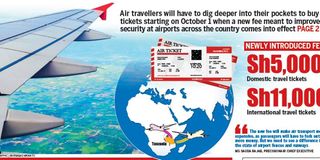New security levy set to push up air ticket prices

What you need to know:
- The fee – which will be incorporated in air fares – has been fixed at Sh5,000 for local travel tickets, and $5 (about Sh11,250) for international passenger tickets.
Dar es Salaam. Air travellers will have to dig deeper into their pockets to buy tickets starting on October 1 when a new security fee becomes operational.
The fee – which will be incorporated in air fares – has been fixed at Sh5,000 for local travel tickets, and $5 (about Sh11,250) for international passenger tickets.
The new fee is meant to help fund improvement of the country’s airports security, according to the Tanzania Airport Authority (TAA) director general, Mr Richard Mayongela.
This will adversely affect airlines which had already sold tickets for flights scheduled for after October 1, as the airlines will have to fork out the fee for their customers.
The executive secretary of the Tanzania Air Operators Association (Taoa), Mr Laurence Paul, told The Citizen that the association has no problem with the new fee. But their main concern is the implementation time frame.
“Some airlines had already sold tickets for future travel, and operators will have to cover the additional costs,” Mr Paul complained, revealing that the operators would meet this week to sort out the issue.
Noting that introduction of new fee is intended to improve security – including buying modern detectors – Mr Paul said “the new fee was agreed at a stakeholders meeting nine months or so ago. But we need more transition period to fix some issues.”
The acting executive secretary of the Tanzania Civil Aviation Authority Consumer Consultative Council (TCAA-CCC), Ms Debora Mligo, shared similar sentiments.
“We are okay with the charges. They are reasonable as far as the security reason is concerned,” Ms Mligo said.
For her part, PrecisionAir’s chief executive officer, Ms Sauda Rajab, said, “The new fee will make air transport more expensive, as passengers will have to fork out more money. But we need to see a difference in the state of airport fences and runways.”
She, however, called on the authorities to diversify their revenue sources to reduce the financial burden on operators in the forms of landing and parking fees, as well as departure and air navigation charges. This is to say nothing of insurance costs, an 18 per cent value added tax on aircraft leasing, spare parts, fuel and skills training.
Fuel accounts for up to 40 per cent of operational costs, while departure taxes for domestic and international travellers are Sh13,000 and $49 respectively.
Passenger service charges are Sh10,000 and $40 for domestic and international flights respectively, with landing charges levied at $5 for every 1,000 kilogrammes of an aircraft’s weight at Dar es Salaam, Kilimanjaro, Zanzibar and Pemba airports.
On the other hand, parking charges for aircraft of up to 20,000kg are Sh1,000 per 12 hours for airlines registered in Tanzania, and $6 for each foreign-registered airline.
It costs $30,000 for a three-year aviation training course, PrecisionAir’s CEO, Ms Rajab, said, adding that “taxes and other charges account for about 50 per cent of a ticket fare. It is high time that the aviation authorities broadened their tax base so that we are not milked further,” she said.




